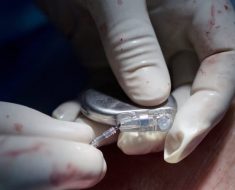
New Murdoch University-led research has revealed a potential way to better preserve the biological activity of bovine colostrum—the first milk from cows—so it can be used as a supplement for vulnerable preterm infants in their first few days of life.
Such milk products are usually processed and treated with heat to ensure their safety, but this may alter the beneficial biological activity of the milk.
The study investigated the potential for gently-processed bovine colostrum, the antibody-rich milk produced by cows straight after birth, to be used as a supplement during the first two weeks of life or as a fortifier during the first month of life for preterm human infants.
Clinical trials are now underway.
Protecting against infection
Dr. Andrew Currie from Murdoch University worked with Dr. Duc Ninh Nguyen and Professor Per Torp Sangild from the University of Copenhagen in Denmark on the project.
“Human colostrum is well known as an important source of nutrients and antibodies for newborns,” Dr. Currie said.
“Mother’s own milk and colostrum is known as the best choice for newborn infants, in part due to its protective effects against infection and gut inflammation,” Dr. Currie said.
“However preterm infants may have a limited access to mother’s milk during their first weeks of life and they are often fed or supplemented with infant formula.”
More than 15 million infants are born prematurely each year (11 per cent of all pregnancies) and they are incredibly vulnerable to infection. Infant formula has been shown to increase the risk of infections and gut inflammation.
Dr. Currie said donor milk was superior to infant formula in protecting against infectious diseases but was difficult to obtain in an affordable and ethical manner, particularly in developing countries.
“As such, we are exploring other potential ways to boost the immune systems of these vulnerable infants, and bovine colostrum is looking to be a very promising option,” he said.
The researchers tested a range of ways to pasteurize the raw cow’s milk to develop a colostrum product that was safe for consumption but still retained its bioactive antimicrobial characteristics.
“We found that gently pasteurised (heated at 63 degrees for 30 min) and gamma-irradiated bovine colostrum retained the antimicrobial properties to promote gut maturation and protect from inflammation and infection,” Dr. Currie said.
Professor Sangild is now completing two clinical trials in preterm infants to reveal the clinical effects of the product as the supplement to mother’s milk (Pre-colos, NCT03085277, clinicaltrials.gov) or as the fortifier (Forticolos, NCT03537365, clinicaltrials.gov) on infant feeding tolerance, sepsis and gut inflammation.
Source: Read Full Article





